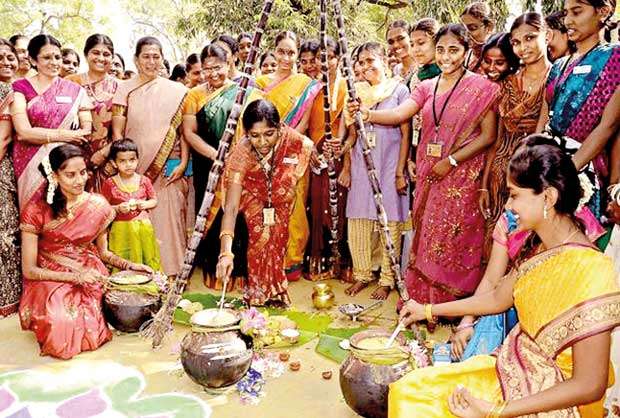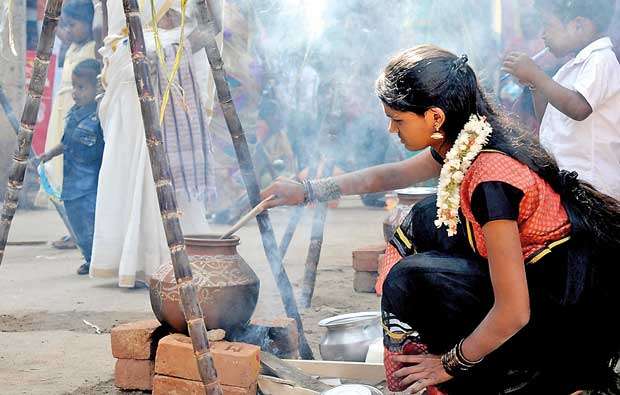Reply To:
Name - Reply Comment
Love and peace are the central themes of Thai Pongal.

 In a bid to thank the nature spirit – the earth, sun and farm animals, Tamils- the farmers in particular – celebrate the Thai Pongal ceremony on the first day of the month of Thai.
In a bid to thank the nature spirit – the earth, sun and farm animals, Tamils- the farmers in particular – celebrate the Thai Pongal ceremony on the first day of the month of Thai.
Farmers offer the first harvest of the field to nature’s spirit, the sun, in the form of cooked sweetened rice.
They do not forget to make this an occasion to thank the farm animals who contribute to the success and prosperity of agriculture in a big way.
Hence their first ceremony of the year was the thanks-giving ceremony. The ceremony is being continued in a grand way as the farmers have not underestimated the importance of the nature spirits and the farm animals. Rice consuming population join the farmers in this important ceremony.
Recipients of the gratitude
The recipients of the above gratitude are farm animals including cows, oxen and buffaloes. Farmers thank the sun god for energizing them and the farm animals for helping them to produce rice in abundance. Meanwhile, the rice consumers in the rest of the population are obliged to venerate the sun god and thank the farm animals for helping the farmers to produce rice and also the farmers for producing rice. The obligation of the rice consuming community
Thai Pongal is an occasion celebrated not only by almost all the Tamils but also by all those who consume rice throughout the world.
The Epoch of Thai Pongal
Thai Pongal is celebrated in the first month of the Tamil calendar. The festive season coincides with the period when the sun enters the zodiac sign of Capricorn (Makara). We in Sri Lanka and a large number of people in many other parts of the world suffered due to heavy rains and floods and we were compelled to depend on nature’s spirit to cast away the rain and welcome the sun.
Boiling to overflow
The Pongal means boiling (of milk or rice) till it overflows. In a sense, Thai Pongal means the preparation and enjoying the first meal of the year with hopes and aspirations.
In other words, this is the celebration of previous year’s achievements with bountiful reap and also a celebration in anticipation of prosperity during the New Year which paves way future prospects.
“Pongal, Pongal, We are getting exactly what we expected
The rituals of this family festival commence with the boiling of a pot of rice at sunrise at the front doorstep of the house.
The purpose of Thai Pongal
In actual fact, the four-day festival is a Thanksgiving festival, which brings prosperity to agriculture.
Hence sun deserves the honour and respect of farmers. Farm animals including the cows, oxen and buffaloes help them immensely in the farm. Therefore, farmers thank the sun as the forerunner of a bountiful yield.
Legends connected with Thai Pongal
Pongal has many legends. The most popular one is the incident of Lord Krishna lifting Vindhan Mountain with his little finger to save his people from being washed away from rain and flood. Another interesting story related to Thai Pongal says that Lord Siva commanded his guard Nandi to go to planet earth and tell his devotees to have an oil bath daily and food twice a week. However, Nandi got it all mixed up and instructed the devotees to eat daily and bathe twice a week. Lord Siva was annoyed and ordered Nandi to stay on earth and help his devotees to plough the land because people have to eat more due to a mistake was done by him.
Thai Pongal – A four-day festival
Thai Pongal is a thanksgiving ceremony running to three or four days. It is the sun which brings prosperity to agriculture. Hence the sun deserves thanks and respect from farmers. Animals including the cow, the oxen and help them immensely in the farm.
Therefore farmers thank the sun, the nature spirit and the forerunner of a plentiful harvest. They also thank the farm animals for their assistance in producing a successful harvest. The rest of the populations take this opportunity to thank the farmers for the production of food.
A number of parties contribute in making the crop abundant. The sun provides energy in the process of food production and sunlight is necessary for plants to grow. Also, there should be rain to provide water which is a must in agriculture. Farm animals help in tilling and preparing the land for agriculture and the farmer is one who makes use of these to make the harvest successful.
Bhogi Pongal
The first day of the festival which falls on the last day of the Tamil month, Margazh is called Bhogi. Bhogi is dedicated to god Indra (Bhogi). He is the god of clouds and rain which makes the crops grow. Bhogi Pongal is also a day for the family. On this day all the people clean their houses from top to the bottom. Colourful garlands made of leaves and flowers are used for decorating the home exteriors. On this day the rain god is worshipped. In India where the majority of the population are farmers, this rural festival is the celebration of the withdrawal of the South-west monsoon and reaping of a joyful harvest.
Suriya Pongal
The second day is “Suriya Pongal” dedicated to the worship of the sun god. The members of the family wake up early on this day to create elaborate kokum on the ground in front of their doorway. Home kokum is created with colourful rice flour placed on the ground carefully by using one’s hand. The festival is consecrated to the sun god as the supreme donor of life’s sustenance. On his benevolence depends on the success or failure of the harvest. In the morning of the Thai Pongal festival day rice from the newly harvested paddy macerated in fresh cow’s milk and highly seasoned with traditional condiments to promote flavour and palatability. This is cooked in front of the house on temporary hearths.

Maatu Pongal
On the day following the Thai Pongal festival of cattle and goats, traditionally known as “Maatu Pongal is celebrated. Maatu means cattle. This is exclusively a festival of thanksgiving dedicated to the mute and dumb friends adored by farmers for their contribution in helping in agricultural pursuits. On Maatu Pongal day the domestic cattle are bathed, anointed and fed to their heart’s content. Cows and bulls are decorated with paint and bells and the people pray for them. In South India, the custom is to tie small bags of money, parcels of expensive cloth and other costly presents around the horns of vigorous bullocks and steers and let them loose in village enclosures. Young, brave men try to snatch the parcels without being attacked by the bullocks. This is a popular game.
In the past farmers appreciated the importance of the nature spirits, the Sun and rain
Kaanum Pongal/ Thiruvallura day
The fourth day is termed as Kaanum Pongal. On this day people travel to see other family members. Younger members of the family pay homage to the elders and the elders acknowledge them by giving token money. For the ritual of Kakkai Chatham, people leave food out on banana leaves for crows (kakkai) to eat.
It is on this day that brothers and sisters meet and sisters show affection and respect to their brothers by presenting gifts and singing aarti (songs sung in praise of deities after offering light) and placing kum on their foreheads ad prostrating themselves and touching their brothers’ feet. Brothers usually respond in kind by offering gifts of clothing and other useful items their sisters would appreciate.It is also on the fourth day of Pongal that poems of poets are revered. It is also called Thiruvalluvar day. Thiruvalluvar is a famous poet. He has written thousands of couplets in the famous work, “Thirukurai on moral and social standards.”
Thai Pongal is also an occasion for the family reunion. Thai Pongal is a festival of freedom. peace, unity and compassion crystallized in the last hymn on unity in the Indian spiritual text, Rigveda. Thus love and peace are the central themes of Thai Pongal.